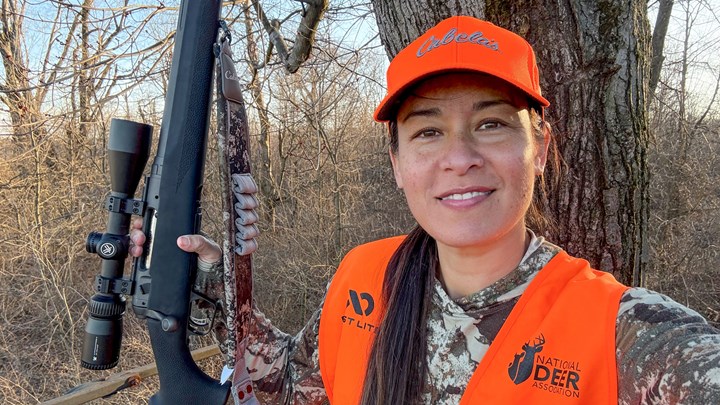
by Brian McCombie - Thursday, August 7, 2025

If you grow up in a non-hunting family, the transition to becoming a hunter in adult life can be difficult. Without the encouragement and experiences of your family, a journey into the world of hunting will feel like a huge and scary mystery.
But what if you are also a vegetarian? Factor this into the mix and one’s chances of becoming a hunter would seem damned slim.
Elizabeth Kligge, the Director of Hunter Recruitment for the National Deer Association (NDA), beat those odds. Today, this former vegetarian with no family history of hunting is not only a hunter herself. She also mentors new people in how to become organic meat-eaters themselves.
Hunting wasn’t a part of Kligge’s childhood, yet neither was vegetarianism. She and her family ate meat regularly. In fact, she ate so much of it her father nicknamed her “The Meat Eater.”
But in high school, Kligge decided it was time to take a stand for something, and her vegetarian cousins became her role models. She loved animals and the vegetarian logic seemed appealing: If you love animals, why kill them? And never ever eat them.
I’m living the right way, she told herself.
The Road to … Roadkill!
After college, Kligge signed up for a primitive survival school, initially as a student, and later became an instructor. Though still a vegetarian, her work at the school gravitated her toward white-tailed deer as she began delivering hide-tanning lectures and field-dressing demonstrations. The work also had her driving local roads in search of road-killed deer to use in her demonstrations.
One day, a friend cooked up venison backstrap from a fresh roadkill and encouraged her to give it a try. She hesitated. But it occurred to her that the deer had died accidentally and, if the deer hadn’t been recovered it would have gone to waste. So, she took a bite.
“It tasted as good as it smelled,” Kligge wrote in the article, “How I Went from Vegetarian to Deer Hunter,” that posted to the NDA website recently, adding, “and that was the end of me being vegetarian.”
A Hunter is Born
It also was the start of her hunting career.
At survival school, she and her students constructed bows and arrows from natural materials, including turkey feathers, sinew, wood, charcoal, tree sap and stone. They tracked animals and practiced using natural camouflage to get close to said animals.
It wasn’t long before she found herself practicing with a modern crossbow, and then a rifle and a shotgun. Target practice quickly led to actual hunting.
“That voice that had been tugging at my insides, it was hunting,” she wrote. “Hunting was calling me. And I couldn’t ignore it any longer. Part of me didn’t feel ready, but I was past the point of no return. I didn’t need hunting in the sense that I was hungry, but I needed to understand what it really was and what it had to teach me.”

From Hunting to a Career in Conservation
Today, Kligge works for the NDA as its Director of Hunter Recruitment. Formed in November 2020, the NDA combined two existing conservation groups: the National Deer Alliance and the Quality Deer Management Association. The core mission of the NDA is to ensure the future of wild deer, wildlife habitat and hunting.
As the NDA website notes, “The National Deer Association will carry forward the reputation for reliable, science-based information for hunters, empowering them to be more informed, successful and engaged stewards of deer and wildlife. Teaching the non-hunting public about the keystone position of deer in the success of all wildlife conservation will be a new goal. We are uniting hunters, state and federal wildlife agencies, the hunting industry, elected officials and non-hunters to ensure the welfare and sustainability of wild deer and their habitat.”
From Hunting to Becoming a Hunting Mentor
One increasingly important (and successful) facet of the NDA mission is its Field to Fork program, a food-focused hunter recruitment program for adults from non-hunting backgrounds. The program teaches these adults every aspect of hunting and how to source their own organic protein.
Thanks to Field to Fork, the NDA discovered that a good many adults actually want to learn how to hunt deer for food. In 2024 alone, it held 49 Field to Fork events in 13 states that produced 463 new hunters. Once these program participants have this hunting experience, more than 80 percent of Field to Fork recruits continue to hunt independently.
Kligge was initially hired in 2022 to be the Pennsylvania Field to Fork Coordinator, teaching dozens of adults the how and why of deer hunting.
“The biggest hurdle for people [to enter the hunting world] is not having a mentor,” Kligge told this NRA Hunters’ Leadership Forum hunting news website. “Even those who previously tried to teach themselves through YouTube and articles were still hesitant to go out alone.”
Field to Fork students are not simply taught about hunting. Their “final exam” takes them afield with an experienced hunter in search of that first deer harvest. Thanks to
If you are interested in mentoring for the Field to Fork program, you can sign up on the NDA website.
E-mail your comments/questions about this site to:
[email protected]
Proudly supported by The NRA Foundation and Friends of NRA fundraising.
